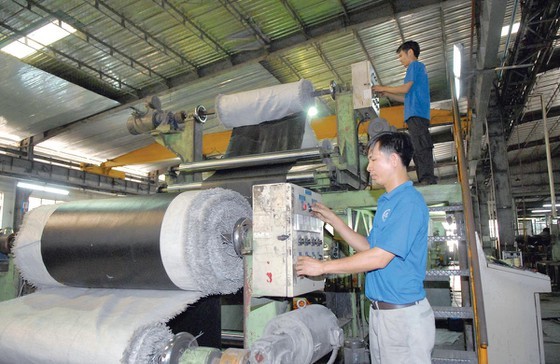
Figures by the Ministry of Planning and Investment showed that by the end of last year, Vietnam had 714,755 active enterprises, an increase of 9.2 percent compared to that in 2017. In order to achieve the target of 1 million enterprises, around 285,000 enterprises must be established in 2019 and 2020. According to experts, this target is not easy to accomplish as besides newly-established enterprises, there are also enterprises withdrawing from the market. In the first seven months, there were 79,300 newly-established enterprises across the country but the number of enterprises temporarily halted operation was 23,100, up 15.6 percent over the same period last year and the number of enterprises waiting for procedures to dissolve was up to 24,800.
Along with the number of enterprises developing naturally each year, there is a great resource that can be transformed into enterprises, which are individual business households. The national census showed that there are 5.3 million individual business households across the country. However, in fact, the number of business households transforming into enterprises was insignificant because of several reasons, of which, the most important issue is that the country has not had suitable support policies or it has had policies but they are implemented slowly or inapplicable. Active enterprises also faced several difficulties during operation. Data by the General Statistics Office of Vietnam in the second quarter of this year showed that some factors affecting the production and business of private enterprises were high competitiveness of domestic goods which accounted for 58.4 percent; low domestic demand 44.3 percent; financial difficulty 33.7 percent; shortage of employees 30.5 percent; and loans with high interest rates 28.4 percent.
On the other hand, current regulations on the order and procedures to enter the market still have some limitations and shortcomings. The process of setting up a business and starting a business in Vietnam is more time-consuming and costly than that in other countries and is considered to be rather complicated. Report by the World Bank, this year, Vietnam ranked 104 out of 190 countries and economies about the process of starting a business. If measuring by the number of procedures and duration, starting a business in Vietnam includes eight steps of procedures and around 17 working days.
According to Dr. Tran Du Lich, a member of the Prime Minister's Economic Advisory Group, said that, in fact, Vietnam already has a staff of more than 700,000 enterprises and more than 5 million individual business households. Who said that business households owning 3-5 laborers are not businesses? Therefore, the first thing to do is to change the mindset about enterprises.
Secondly, it is essential to evaluate the scale of enterprises in each period. For instance, how have enterprises established in 2010 developed until now.
‘I have learned from a US registration agency that specializes in managing small businesses such as barbershops and nail salons with a scale of 2-3 employees. This agency has very specific statistics that in the past 5 years how many businesses had been established and closed down. The agency does that so as to consult newly-established enterprises to study that whether the policy is suitable or not and why enterprises have not grown up. Therefore, in my opinion, reaching 1 million enterprises is not as important as it is for us to have the statistics and analyze that in the past five years under the effectiveness of the Enterprise Law, how many enterprises have been established, of which how many enterprises have grown up and how many ones were unable to grow up and why that is,’ said Dr. Tran Du Lich.
He said that ten years ago the country only had around 300,000 enterprises operating under the Enterprise Law, contributing 8-9 percent to the gross domestic product (GDP). Now, the number of enterprises was more than two times higher but economic contribution remained the same. Particularly, among 40 percent of GDP from the private sector, individual business households contributed up to 31-31 percent whereas enterprises merely accounted for nearly 10 percent. This ratio was too low. Then, why we did not pay attention to sectors that contribute greatly to the economy instead of focusing too much on enterprises. Why we did not study why business households were reluctant to become enterprises. Once we understand those entanglements, we will be able to have suitable policies, hereby, we will be able to achieve our target.
According to Mr. Lich, it is important to have measures to gradually upgrade individual business households to enterprises as well as measures for tax declaration for this business model. Succeeding in doing this, we will be able to develop accounting service, creating favorable conditions for enterprises to do business more transparently.
Dr. Tran Dinh Thien, former director of the Vietnam Institute of Economics, said that it is important for Vietnamese enterprises to actually grow up and become the main motivation of national economic development. Revising the Enterprise Law is not only to solve shortcomings in law enforcement but also to help enterprises to do business with lower and safer costs, thereby increasing attraction of every resources and investment capital into production and business.
























